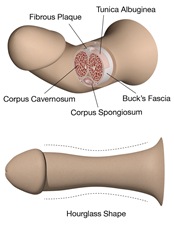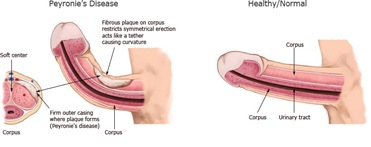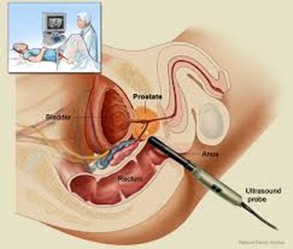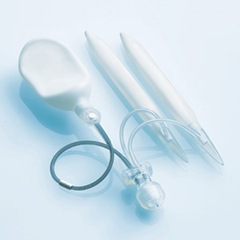 Have you noticed a significant bend or pain in your penis, which has interfered with your ability to get or maintain an erection? Can you feel flat lumps of bands of hard tissue under the skin of your penis? Peyronie’s disease can alter your quality of life. Your urologist will be able to evaluate your condition to determine whether treatment may help and to rule out other causes of your symptoms.
Have you noticed a significant bend or pain in your penis, which has interfered with your ability to get or maintain an erection? Can you feel flat lumps of bands of hard tissue under the skin of your penis? Peyronie’s disease can alter your quality of life. Your urologist will be able to evaluate your condition to determine whether treatment may help and to rule out other causes of your symptoms.
What is Peyronie’s Disease?
Peyronie’s disease is caused from the development of fibrous scar tissue inside the penis which causes curved, painful erections. Peyronie’s disease can cause a distinctive bend or severe pain making it difficult to get or maintain an erection, which interferes with sexual activity.
What Causes Peyronie’s Disease?
Peyronie’s disease is often caused by the rupturing of small blood vessels due to an injury to the penis during sex, athletic activity or an accident. In Peyronie’s disease, problems in the healing process cause permanent scar tissue to develop under the skin of the penis. It is believed that some men are more susceptible to Peyronie’s disease if they have the inherited trait.
What are the Symptoms of Peyronie’s Disease?
Often the symptoms of Peyronie’s disease occur gradually causing the curvature and pain to increase over a period of time.
-
Scar Tissue-The scar tissue develops under the skin of the penis. This scar

tissue can be felt as a flat lump or a band of hard tissue.
-
A noticeable bend to the penis-Your penis may be bent upwards, downwards, or bent to the side.
-
Erections problems-You may have difficulty getting or maintaining an erection.
-
Shortening of the penis-you may notice a shortening of your penis.
-
Pain-Pain may be present during erection, an orgasm or anytime something touches your penis.
Tests and Diagnosis for Peyronie’s Disease
Peyronie’s disease can be diagnosed with a physical exam by your urologists and performing tests which can determine what is causing your problem.
-
Physical Exam-your urologist will palpate your penis to find the location and the amount of scar tissue you have.
-
Tests-your urologist may order ultrasound and/or x-rays, to test for abnormalities, scar tissue and decreased blood flow to your penis.
Medication and Treatment for Peyronie’s Disease
Medications haven’t proven to be as effective for reducing the curvature and pain related to Peyronie’s disease as compared to surgery which has a better success rate. The medications you may receive are given via injection, they are:
-
Verapamil-this medication slows down the development of scar tissue by disrupting the production of collagen.
-
Interferon-is a protein which breaks down the fibrous scar tissue caused by Peyronie’s disease.
Surgery for Pyeronie’s Disease
The type of surgery your urologist will perform depends upon the severity of your condition. The most common and most effective surgical procedure for Peyronie’s disease are penile implants. After surgery you will need to wait 4 to 8 weeks before resuming sexual activity.
Don’t suffer the pain, and suffering caused by Peyronie’s disease call the best urologist NYC today and get your quality of life back.
 Dr. Larish is a urologist and surgeon treating women and men with a variety of urological conditions. His expertise is in treating complex kidney stones, enlarged prostates (BPH), incontinence, erectile dysfunction, infertility, and urological oncology (prostate, bladder, kidney, and adrenal cancers). He is an expert in general urology and is often consulted for second opinions.
Dr. Larish is a urologist and surgeon treating women and men with a variety of urological conditions. His expertise is in treating complex kidney stones, enlarged prostates (BPH), incontinence, erectile dysfunction, infertility, and urological oncology (prostate, bladder, kidney, and adrenal cancers). He is an expert in general urology and is often consulted for second opinions.




 Have you noticed a significant bend or pain in your penis, which has interfered with your ability to get or maintain an erection? Can you feel flat lumps of bands of hard tissue under the skin of your penis? Peyronie’s disease can alter your quality of life. Your urologist will be able to evaluate your condition to determine whether treatment may help and to rule out other causes of your symptoms.
Have you noticed a significant bend or pain in your penis, which has interfered with your ability to get or maintain an erection? Can you feel flat lumps of bands of hard tissue under the skin of your penis? Peyronie’s disease can alter your quality of life. Your urologist will be able to evaluate your condition to determine whether treatment may help and to rule out other causes of your symptoms. tissue can be felt as a flat lump or a band of hard tissue.
tissue can be felt as a flat lump or a band of hard tissue.
